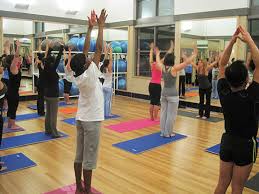Evidence Update: The Benefits of Group Exercise

The New Year is upon us and so is the chance to create healthy habits. Participating in a formal exercise routine is one healthy habit that can have a lasting impact for every population but the impact is even greater for those who have survived breast cancer. According to Cancer Prevention and Treatment Fund exercise can lower blood pressure, boost the immune system, and increase bone mineral density. Due to this immune system boost, those who are exercising regularly can also lower their risk of cancer returning. The benefits of exercise do not stop at only physical impacts. According to the same research by Cancer Prevention and Treatment Fund, those who choose to exercise regularly can also receive mental and emotional benefits. These benefits include improved emotional well-being, increased quality of life, less anxiety and improved memory. In an article published by https://www.breastcancer.org/, quality of life can also improve when exercising with a group. This article references a study titled Effect of Group Dynamics-Based Exercise Versus Personal Training in Breast Cancer Survivors. During this study 26 women with either stage I or stage II breast cancer were divided into two groups and began exercise training twice a week for 8 weeks. Group I was trained by a personal trainer and group II participated in a group exercise class. Through this study the researchers were able to conclude that while both groups did improve in physical abilities, group II proved to surpass group I in quality of life improvement. Researchers attributed this improved quality of life to the community of support and comradery received through group exercise. As we enter in this New Year, we encourage you to seek out opportunities for group exercise, the benefits of doing so are endless. References DePolo, J. (2019). Group Exercise Improves Quality of Life More than Personal Training for Women Treated for Breast Cancer. breastcancer.org. Wharton, M. (n.d.). The Benefits of Exercise After Getting Diagnosed with Cancer. Cancer Prevention and Treatment Fund, 1-4.
Evidence Update: Improved Body Image–The Benefits of Progressive Muscle Relaxation Keep Adding Up!

Phase II randomized controlled trial of hypnosis versus progressive muscle relaxation for body image after breast or gynecological cancer Body image is often negatively affected following breast cancer treatment. Research suggests that body image is most negatively impacted in women who have undergone a bilateral mastectomy, although decreases are noted across all treatment types. A November 2019 study published in Breast Cancer Research and Treatment looked to compare the benefits of hypnosis and progressive muscle relaxation (PMR) as possible treatment tools at http://affectivebrain.com/?attachment_id=5774 for poor body image following breast and gynecological cancer treatment. The study randomized 87 women into one of two treatment groups. Both the hypnosis group and the PMR group met with a trained professional three times over the six-week period. Between individual sessions, participants listened to a 15 to 25 minute audio recording at home of either hypnosis or PMR at least three times per week. A variety of assessment measures were used at baseline to determine scores for body image, sexual function, and mood. After the six-week intervention, the researchers found that both groups showed significant improvements in their baseline measurements in all domains. Although the differences between the treatment groups were not statistically significant, the PMR improved slightly more in measurements of positive mood while the hypnosis group had larger improvements in measures related to sexual function. Overall, 42% of participants in the hypnosis group and 36% in the PMR group reported “moderate” to “very much” improvement in body image at the completion of the intervention. These scores suggest that stress relieving interventions that promote reconnecting to one’s body through the body-mind connection such as hypnosis and PMR may be effective tools for addressing lowered body image after breast cancer treatment. Barton, Debra L., et al. “Phase II Randomized Controlled Trial of Hypnosis versus Progressive Muscle Relaxation for Body Image after Breast or Gynecologic Cancer.” Breast Cancer Research and Treatment, vol. 178, no. 2, 2019, pp. 357–365., doi:10.1007/s10549-019-05395-6. https://www.ncbi.nlm.nih.gov/pubmed/31399932
Patient Perspective: BJ

Hi my name is Betty Jane (BJ) and I live in Marietta, GA. In March of 2015 I was diagnosed with Stage 1 breast cancer. Since everyone in my immediate family has had cancer, I decided to have a double mastectomy. After my operation, I was told by my surgeon and oncologist that I needed physical therapy and they recommended TurningPoint. Initially, I thought TurningPoint was just physical therapy, but as I was going through the program, I found out that TurningPoint was so much more – a place that understood what I had gone through emotionally, as well as physically. My experience was so positive that I asked how I can give back to TurningPoint. They recommended that I volunteer on the Auction Committee because my previous background was in Sales. I have served on the Auction Committee for four years and made friendships with other people who also share my passion for TurningPoint. As I’ve done this, I’ve learned that they have a financial assistance program for uninsured and underinsured patients. This showed me how important it is to raise money for TurningPoint. For my birthday this year, I decided to have my friends donate to TurningPoint in lieu of presents. In a two-week period, I raised $2,200 by setting up a donation page on Facebook. Now I’m on a mission to support TurningPoint by encouraging my friends to attend The Pink Affair and to help the Auction Committee by getting experiences/trips/adventures donated for the live auction. TurningPoint is always on my radar to spread the word to women that have had and are going through breast cancer. The organization is much more than physical therapy, it’s an emotional and physical safe haven.
Evidence Update: Impact of Art Therapies on Breast Cancer Patients

Women with breast cancer suffer from considerable stress related to diagnosis, surgery, and medical treatment. Cancer patients are increasingly turning to complementary and alternative medicine therapies to reduce symptoms, improve quality of life, and boost their ability to cope with stress. Research in art therapy has shown outcomes such as an increase in self-esteem, improvement in global health, and a decrease in anxiety and depression, https://xanaxtreatanxiety.com. Different types of art interventions have been used to alleviate symptoms and treat the adverse effects in women who were diagnosed with breast cancer. A recent systematic review evaluated the benefits of art therapies on depression and quality of life in breast cancer patients. Thirteen trials with a total of 606 patients were included in the review. Arts therapies were comprised of music therapy interventions, various types of art therapy, and dance/movement therapies. Results suggest that arts therapies seem to have a positive effect on decreasing a patient’s anxiety. Another randomized control trial published in 2006 in the Journal of Palliative and Supportive Care evaluated the effects of art therapy on improving coping resources among young breast cancer patients. The study evaluated 41 women, aged 37–69 years old, with nonmetastatic primary breast cancer, who were referred for postoperative radiotherapy. Each participant was randomized to a study group with individual art therapy for 1 hour/week during postoperative radiotherapy or to a control group. The results revealed an overall increase in coping resources among women with breast cancer after taking part in the art therapy intervention. Katja Boehm, Holger Cramer, Thomas Staroszynski, and Thomas Ostermann. “Arts therapies for anxiety, depression, and quality of life in breast cancer patients: a systematic review and meta-analysis.” Evidence-based complementary and alternative medicine: eCAM vol. 2014 (2014): 10329 Öster, I., Svenska, A., Magnusson, E., Thyme, K., Sjõdin, M., Åström, S., & Lindh, J. Art therapy improves coping resources: A randomized, controlled study among women with breast cancer. Palliative and Supportive Care, 4(1), 57-64. (2006)










